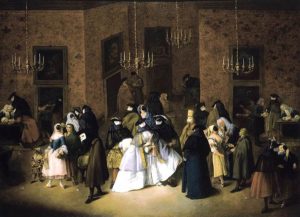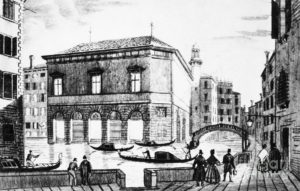
“My dear Mrs. Darcy,” said Mrs. Hoppner, wife of the English consul, seated in her pretty drawing-room overlooking the Grand Canal, “we are most gratified by your calling upon us. You live far too retired a life here in Venice, indeed you do.”
She was a plump Swiss lady, whose husband, son of a well known artist whom Darcy had known back in England, was a sensible man, and very hospitable to the handsome, wealthy Darcys. It was felt that the younger couple would make a valuable adornment to the consular receptions, but the Hoppners were frustrated by their reluctance to accept invitations.
“Truly, I do not think our life here can be called retired,” Elizabeth objected. “It is any thing but quiet. Why, in the weeks up to Carnival, this whole city has resembled a caravanserie, or a circus – it is almost overpowering. When you step out into the street, you scarcely know if you will be run down by a harlequin, a magician, or an acrobat!”
Mr. Hoppner nodded. “Exactly so. You paint it most correctly, Mrs. Darcy. Lord Byron, whom I count as my friend, calls Carnival ‘an orgy of fiddling, masquing, singing, and t’other thing.’ I hope you will excuse his roguish turn of phrase!”
“No one can complain of Lord Byron’s turn of phrase, Mr. Hoppner,” said Mr. Darcy. “It may not be what is usual in polite English society, but his genius and felicity for language are undoubted.”
“Venice is never quiet during Carnival, Mrs. Darcy, but you are seldom seen in society,” Mrs. Hoppner persisted. “Sure, you must be lonely? Why, you never even attend Contessa Arbrizzi’s salon.”

Contessa Albrizzi
Elizabeth flinched, but tried to conceal it. “I did venture there once,” she murmured reluctantly, “but found it not much to my taste.”
“Really? The Contessa collects the cleverest people, I do assure you, and has the most intellectual conversazione in the city.”
“Perhaps I was there on an afternoon when the talk had gone off, like stale milk. The ladies I heard talked of nothing but their men, to the exclusion of all else.”
“Why, was not Lady Somerville there, who speaks Greek? And Madame Petritine, who is writing about Mary Wortley Montague?”
“They were not. And the tone was – well, not of a sort to suit me, shall we say.”
Mrs. Hoppner was curious. “What was the subject, if you don’t mind my asking?”
Elizabeth sighed, and glanced toward her husband. “They were discussing ways to manage their husbands and lovers. One assured us of the efficacy of making the sign of a cross over your man.”
“What, after he was dead?”
“No; the practice was intended to make him more – alive.”
“Oh! Are you sure? I have heard that making ‘crosses over’ is something the Venetian women do when church bells ring.”
Mr. Hoppner laughed. “My dear, you have heard wrong. The story is that if the bells ring while they are engaged in unholy behavior, they make crosses but do not stop the activity.”
“Oh, shocking,” said Mrs. Hoppner, indifferently, reaching for the silken bell-pull. “I believe they are late bringing us our refreshment.”
The Darcys looked at each other helplessly. Their mutual glance spoke of a desire to depart.
Mr. Hoppner took pity on them. “My dear, you must remember that our visitors are not as used to hearing of the morals of the Venetians as we are. After our years of residence here, our sensibilities may be somewhat blunted.”
“I don’t want to appear the prudish English lantern-jawed husband,” put in Mr. Darcy, “but the mix of mistresses and bluestockings is not what an English lady can well be expected to endure.”
“But you can pick and choose your friends,” cried Mrs. Hoppner, “and consort with the learned ladies rather than the strumpets.”
“They are usually the same,” noted her husband, philosophically.
“Or you will be lonely, Mrs. Darcy, and I hate to see that. You must not be too nice. But then, you are living at Palazzo Mocenigo, are you not? Byron is your neighbor. Have you not found him a charming companion?”

Byron’s favorite portrait of himself
Elizabeth looked down, embarrassed. She had told her husband about the assignation note his lordship had left for her, and they had agreed not to speak to the poet again.
“He has been very kind to us about our children,” she said, “and has kept his animals from frightening them. But his way of life…”
“It is very true. I can say nothing in favor of that,” Mr. Hoppner agreed. “He proclaims that he confines himself to the strictest adultery. But he is such an extraordinary fellow, however, that somehow, you have to forgive him his peccadillos.”
“Do you remember when you said you might hire a Vice Consul,” his wife giggled, “and he said it was the only vice wanting in Venice.”
“He is one of the cleverest men in the world, certainly,” said Darcy, “but with manners and morals such that I do not like my wife to be exposed to them. Can you blame me?”
Mr. Hoppner took a shrewd look at Elizabeth. “Certainly not. I am afraid that Lord Byron would be dangerously susceptible to those dark eyes. He does like a pretty woman.”
“Oh, Mrs. Darcy need have no fear,” Mrs. Hoppner protested. “Lord Byron is a gentleman. You have often said so yourself, my dear.”
The Venetian manservant here brought in a gilt china service and a chocolate pot, containing a potion of deepest, darkest chocolate, and a plate of small puff cakes with cream.
“Morals and manners may be questionable in Venice,” Elizabeth could not help exclaiming, “but no one can help but admire the pastries.”
“I am glad you like them! These are from Caffe Florian.”

(Antique chocolate pots. Collezione di Diana Birchall)
“My wife is right,” said Mr. Hoppner. “Lord Byron would never force himself upon a lady who was unwilling. He does not need to. He finds women here aplenty to purchase.”
“My dear! For shame. You will shock our visitors with such talk.”
Hoppner shook his head impatiently.
“Isabella, this is Venice, not London or Switzerland. We are thought prudish here, but in Venice one must sometimes allude to things that would not be spoken of in our home countries.”
Mrs. Hoppner put down her chocolate cup and delicately patted her lips. “Yes. You may be surprised to hear, for instance, Mrs. Darcy, that we have, at times, taken charge of Lord Byron’s little daughter, and kept her in our own household.”
“His daughter! I thought she was in England, with Lady Byron.”
“No, no, Allegra. His natural daughter, not two years old. It is uncertain what he will do with her, poor little mite.”
Darcy shook his head but said nothing. “Oh! He is worse than we thought,” exclaimed Elizabeth.
“His Lordship does have a taste for low living,” acknowledged Hoppner. “He is decadent, and all right-thinking gentle people would deplore his behavior; but his great qualities are great indeed, and I confess that I do find him a man to be liked.”
Both Hoppners, though virtuous themselves, were socially ambitious, and had a decided taste for gossip, which gave a relish to their lives in Venice, as the Darcys were beginning to perceive.
“But what can you find in common with him, as a friend, a man of such tastes?” asked Darcy.
“Many things. First, it is a privilege to hear him talk about literature, and he is generous in sharing early versions of his writings with those friends who care about it. Then, I often act as his man of business – I have arranged for him to rent our country house in Este – but perhaps most satisfying of all, we go riding on the Lido together several times a week, racing our horses on the sands.”
“You paint a most attractive picture of the friendship, but is he respectful of your own more domesticated habits? Of your marriage?”
“Perfectly. He is a perfect gentleman in those respects. That is why I thought he might suit you, too, as an entertaining neighbor and companion. He would be delighted to introduce you into society.”
“That may be so,” said Elizabeth, “but we see quite enough of the Venetian society to suit us, and are perhaps more captivated by the place than the people. The ancient art, the palazzi, the colours of the lagoon – yesterday, when it rained, the sky was positively red and orange. Oh! There is beauty such as I never shall forget, when we depart, as we will next month.”
“My dear Mrs. Darcy, before you leave, you must take part in Carnival! It will all be over on Shrove Tuesday, you know, and tomorrow night is the great event at La Fenice. The famous Ballo della Calvachina! Please do take tickets for that. We will escort you, and see that you are safe and comfortable, won’t we, Richard?”

La Fenice
“Of course. And it is really something to see, if only for once in a lifetime, Mrs. Darcy, I do assure you,” said Mr. Hoppner earnestly.
“We have seen Carnival already, in the streets and plaza,” Mr. Darcy protested, “the gondolas garlanded, entertainers everywhere. Quite enough to get the idea. We can do without the beggars and the street women, and do not take our pleasure in such places as the ridotti. Are they not veritable gambling hells?”
“Oh! No indeed, there are strict rules, to be sure. But you simply must see the centerpiece of all, the grand bal masque at the Theatre La Fenice,” pursued Mrs. Hoppner eagerly. “Every one comes masked, of course, it is the Venetian tradition, that allows the different classes to mingle. Commoner and nobleman, can be together without acknowledgement.”
“That may be quite interesting,” said Darcy, “but we have no masks.”
“Why! They sell them everywhere, to be sure. And they are not the fanciful masks of former days. Times have changed, since the fall of the Venetian Republic at the hands of Napoleon, you know. The men now wear only the simple bauta mask, white, with a pointed nose, that covers the face; and women wear a little round black moretta that merely hides their features. They are most becoming, and when you wear your mask, and a long cloak, no one can tell who you are!”
“Yes, you can dance with any one, and there is great freedom,” said Mr. Hoppner. “You might dance with a gondolier – or with Lord Byron!”
“I do not think I should like my wife to dance with either,” protested Darcy.
“And special little rooms are provided up on the third floor of the theatre, where the boxes are, for new couples to have privacy, or to pay their gambling debts with their bodies, as I regret to say some do.”
“Good God, sir!” exclaimed Mr. Darcy, “you don’t mean to suggest such a thing as – “
“No, no, of course not,” said Hoppner hastily. “Persons of the highest morality go to the Carnival celebrations at La Fenice, and do not misbehave in the least, nor attend to those who do! No, there will be a fine Rossini opera, you will see, and dancing, and feasting. The theatre will be completely illuminated, and no finer spectacle can be seen in Europe, I do assure you. Have no fear, we will chaperone you, and it will be something you never will forget!”
“What do you say, Elizabeth?” inquired Darcy. “I believe there will be no real danger, and it is true we will not have such a chance again. Would you like to go to Carnival?”
“Yes, I think I would,” she answered.


4 comments
Skip to comment form
The famous Ballo della Calvachina to come…. Meanwhile I will think of the chocolate pots containing the deepest darkest potion and, of course, the puff cakes of cream!
Thanks, Joyce, I think I really must write more about food. Goodness knows I think about it all the time…
I have a feeling that the Darcys will see Lord Byron once again at the Carnival–and that he will likely approach Elizabeth once again.
I have long been a fan of Byron’s poetry; Don Juan is such a clever satire, and I enjoyed studying it greatly in college. But Byron’s lifestyle was certainly questionable (at best), and I don’t blame the Darcy’s for wishing to avoid him. I was afraid that his note to Lizzy would be found by Darcy and misunderstood, so I’m quite relieved to learn that Lizzy informed her husband of the note.
Looking forward to the Carnival!! Thanks for sharing your writing with us, Diana!!
Warmly,
Susanne 🙂
Thanks for commenting, Susanne – I was wondering if anybody could see this post, as there seems to be something wrong with the Facebook algorithm. Of course Lizzy would be honest with Darcy…though Carnival is coming!